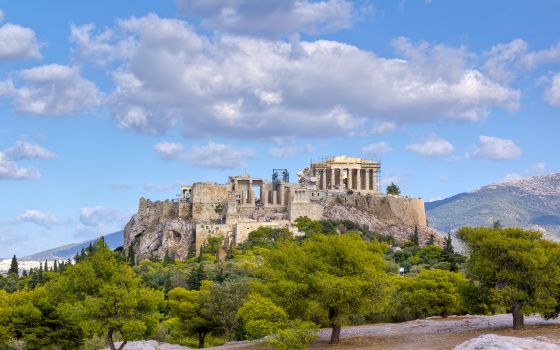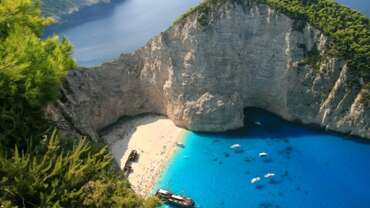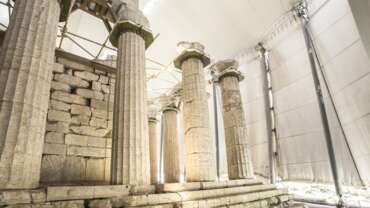Touring in Greece
Greece is a country teeming with myths, traditions, history and living culture. Travellers choose it as a destination not only for its incomparable natural beauty, but because it is a magical place, full of discoveries, charm and secrets. Travelling in Greece is at the same time a way of becoming acquainted with the origins of western civilization. Let yourself be captivated by its historical wealth and singular modern reality. A trip to Greece is the experience of a lifetime that leaves the pleasant feeling that the world is ultimately very rich, very beautiful and very interesting.
In the footsteps of Pausanias
Pausanias is without doubt, the greatest traveller in antiquity. His many-volumed, multifarious work is the archaeologists’ ‘bible’, as by following his descriptions they have managed to excavate significant ancient cities and bring to light unique treasures.
Pausanias journeyed throughout Greece. He was the archetypal travel writer, collecting myths, legends, traditions, folklore, as well as information on the everyday life of the places he visited. At the same time he recorded in great detail the layout of cities, important sanctuaries and major architectural works, along with administrative arrangements and social relationships. In honour of this great social scientist, the National Trail 031 in the Peloponnese is called the ‘Pausanias’ trail’. It is an exceptional route that starts from Patras and ends in Olympia, passing through some of the most beautiful areas of Achaia, Arcadia and Ileia. Many societies organize trips to walk the trail and in this way one can enjoy the route – especially in spring or autumn – with other nature lovers and hiking enthusiasts.
Flavours, colours and aromas
Travelling around the Greece of Dionysus and fine wines is a trend that has conquered the hearts of tourists. Lovers of fine wines and spirits follow the wine roads, combining their acquaintance with the Greek natural world and the ‘hunt’ for that splendid, liquid treasure.
As one sets out along these charming roads, they will at the same time experience local culture. Hamlets around the vineyards, traditional guesthouses and ‘temples’ to authentic Greek cuisine go to make a world filled with enjoyment and excitement.
Greek caves – the depths of nature
The Greek land is scattered with caves exceeding 8500 in number. Major geological processes have endowed the bowels of the Greek earth with true monuments to nature, filled with charm and mystery.
Some of the caves are renowned all over the world for their significant anthropological findings, such as Petralona cave in Chalidiki and Franchthi cave in the Peloponnese.
Human history has been linked to these mystical caves. Many of them were refuges for primeval man; others were important places of worship. The power of nature, manifesting itself in the silence, unseen by human eyes, has captivated all cultures. Great chthonic deities were regarded as the protectors of caves in Greece, like the mythical “Pories”, beings with great intelligence and bodily features both human and serpent-like.
Greek caves, like Melissani on Kefalonia, those at Alistrati and Prosotsani in Macedonia, the Perama cave in Ioannina, Epirus, the famous cave of Paiania in Attica, the caves of Limnes and Diros in the Peloponnese, Diktaion Antron (Diktaean Cave) in Crete, fascinate visitors with their inner, complex decoration. Stalactites and stalagmites of incredible beauty, an ‘architectural’ structure that forms halls similar to those in royal palaces, underground waters, crystal-clear and mystical, create unparalleled underground landscapes.
Many caves have been linked to religious tradition, like Mega Spilaion in the Peloponnese and of course, the famous Cave of the Apocalypse on the island of Patmos. There are also many small caves that were always considered sacred places, which have been converted into Orthodox churches, like Agios Konstantinos in the Peloponnese at Pellini .
Apart from being one of the special sights to see when travelling around this country, a visit to a Greek cave is a deeply mystical experience.
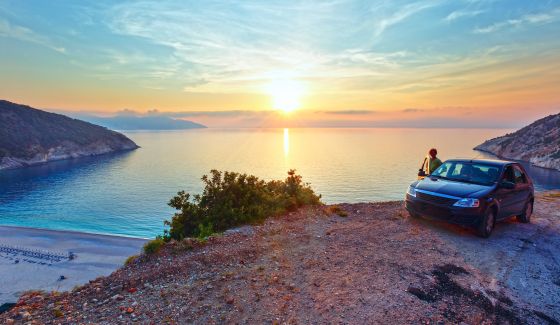
By Car & Motor-bike
From data supplied by Eurostat, we know that the privately owned passenger vehicle or car remains the most popular transportation means for going on holiday in nearly every E.U. Member-State.
Greece is a country where four-wheel enthusiasts are given the opportunity to enjoy their travels by car, especially on the mainland, but also on the larger islands such as Crete, Rhodes, Lesvos, Corfu, etc. However, a tourist is also able to rent a car in any region in Greece, even on the smallest islands, by rental companies that you will come across wherever you go.
The car has an unbreakable relationship with the daily lives of the Greeks. And the result is that in Greece you can find almost whatever you need without much difficulty.
Traveling by car amongst other things makes it easy to travel around in any weather condition, summer or winter. The road network and road-signs in Greece are somewhat problematic and increased attention is needed, especially driving along the rural road network.
Check the vehicle that you will be using so that it will be in the best possible condition and your trip can therefore be enjoyable and above all… safe!
Schedule your trip correctly and enjoy it from the beginning!
By Bicycle
Sightseeing by bicycle is an activity that allows the rider to discover the environmental and cultural wealth of a region in the most pleasant and ecological manner. At the same time, he feels happy that he himself is contributing to the cultivation and development of an ecological conscience. This is an alternative, environmental-friendly transportation philosophy. Another athletic-tourist activity that is recently gaining more and more friends is mountain-biking. The mountain bike can be used both in the city as well as in the countryside, for a stroll or to exercise.
Sightseeing through nature by bicycle is in great demand and has developed accordingly. Biking allows the sightseer to travel greater distances than by hiking. The route that an interested cyclist can follow is characterized by its degree of difficulty, with respect to his physical condition and his experience.
Mountain bike programs are offered in many regions in the country throughout the year, covering all levels of difficulty.


On Foot
In previous years and before the integrated highway network was built in Greece, transportation and communication was carried out along the main road arteries that bisected the country, but mainly along paths which the older residents of the highland villages still call “dimosia” (dimosios = public road), because for them this was the main road access. Even though some of these older paths and the stone-paved cobbled roads –which are real works of art- have been converted into asphalt-surfaced roads, most of these still “slither” between the asphalt roads and continue to exist by crossing mountains, scrubs and ravines.
Thus, in recent years and with financing from various bodies (Municipalities, mountain-climbing clubs, private individuals, etc), many sections of these “road-paths” throughout Greece were serviced, restored and road-signs added, and in this manner created a broad network with a total length of approximately 3,500 km. The major part of this network is extensions to the European Long Distance Walking Paths, Ε4, Ε6 and categories Ο (3,000 km), while another 500 km of smaller walking paths have been created, which are also of comparable interest.
E6 Walking path
The Greek section of this Path has two branches: The first begins from the area of Prespes, passes through Kastoria, Ioannina and Dodoni, and concludes at the city of Igoumenitsa. The second branch begins from the region of Florina, bisects the highland regions of Western, Central and Eastern Macedonia , travels along the borders of Greece with FYROM and Bulgaria, and ends at the city of Alexndroupolis, in the region of Thrace.
E4 Walking path
This begins from the Pyrinaia Mountain Range and reaches Greece via former Yugoslavia. The Greek section of the E4 bisects Northern and Central Greece, the Peloponnese, arrives in Gythio and continues onto the island of Crete. The hiker or mountain climber thus has the opportunity to enjoy the whole extent of Greece’s landscapes and the riches of nature. The highest elevation of the total route is the Olympo Skolio peak (2,911 m).The ideal period for hiking along the Ε4 Walking Path is from May 15th to the beginning of October, because some villages along the route are inaccessible during winter, which therefore limits the places where a hiker can stay overnight. Frequently the opening of new forest roads confuses the hiker-sightseer. The climate is Mediterranean, very dry in summer with high temperature variations between day and night. Snow will be encountered along the route from November to June. The route to the southern section of the Walking Path (the Peloponnese and Crete) is more “walkable” than the northern section, as the hiker can walk here throughout the year since the climate is milder.
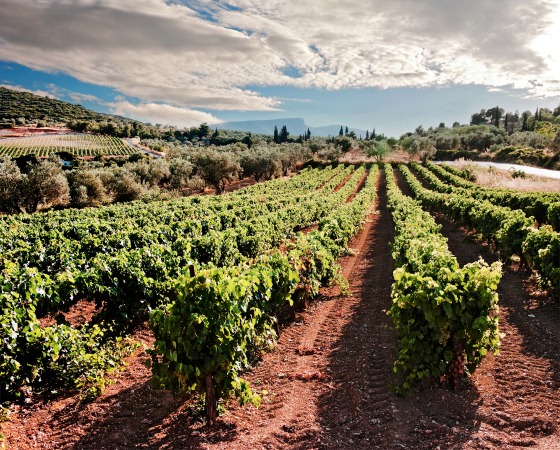
Wine Routes in Greece
The tradition of wine-making is a long and rich one in Greece, as is the case with all Mediterranean countries. Wine – the gift of god Dionysus – is associated not only with the nutritional habits of Greeks, but also with religious and popular traditions connected with their cultural heritage.
The Wine Routes are a special form of agritourism created to maintain and promote this heritage. There are selected routes for visitors to follow, which pass through the most picturesque viticultural areas and wineries. You are welcome to taste local wines paired with traditional appetizers and titbits, and to explore nearby traditional villages, archaeological sites, museums, etc.
Wine tourism can grow in harmony with the natural environment. It will offer you the opportunity to learn about each destination, its local viticultural and wine-making traditions. Local restaurants, tavernas, ouzo eateries and hotels will offer you traditional hospitality, as part of Greece and its culture.
Wine Routes
Much like silk back in the old times, winemaking too follows particular routes which pass through the major grapevine regions and wineries. Along these routes, you will be invited to sample local organically grown wines produced in limited quantities, some of which have won awards in international competitions. Getting acquainted with the wine-making process will help you appreciate even more this precious product.
The winemaking areas of Northern Greece are known for their quality wines. In the region of Thrace wine routes stretch by River Evros, they are on Samothrace Island, in Rodopi and Xanthi areas. In Macedonia visit the wine vineyards in Kavala, Drama, Serres, Halkidiki, Thessaloniki, Kilkis, Pella, Florina, Kastoria, Grevena, Kozani, Pieria and Imathia regions. In Thessaly, there are viticultural zones in Larisa, Magnesia, the Sporades Islands, Karditsa and Trikala areas. In Epirus, you will find wine-producing fields in Ioannina, Arta, Preveza and Thesprotia. The Ionian Islands of Corfu, Paxi, Lefkada, Kefalonia, Ithaca and Zakynthos (Zante) all have their quality vineyards.
The region of Central Greece comprises viticultural areas in Aitoloakarnania, Fokida, Evrytania, Fthiotida, Voiotia, Evia, Skyros Island and Attica. In the Peloponnese the wine routes run along Corinthia, Achaia, Ileia, Messinia, Laconia, Arcadia, Argolida and Kythira Island. The Aegean Islands of Lesvos, Limnos, Chios, Samos, Ikaria, the Dodecanese Islands, the Cyclades and the island of Crete are all wine-producing areas.
A palatable colourful journey in the world of wine
Become a wine tourist and learn about the local cultivation methods in the heart of nature. Enjoy your tour of the green vineyards and taste new or older labels in the cellars of the well-tended local wineries, where wine aromas fill the air and euphoria captivates all senses. Stay in small traditional guest houses and learn about the viticultural methods and the local fermentation procedures for making wine.
Sip your glass of red, rosé or white wine in the peaceful Greek countryside, as wonderful scents drift in the air; a delight as simple as it is memorable. “Wine makes glad the heart of man” is an ancient saying, the truth of which you are invited to experience as a wine tourist in Greece.
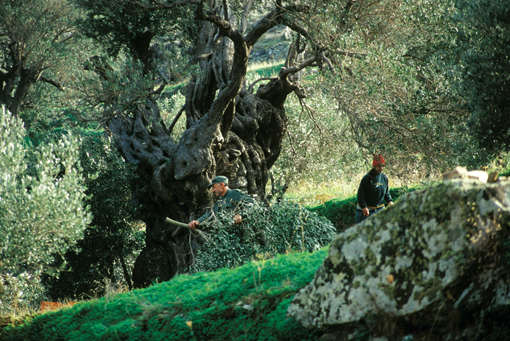
Olive Routes
“The Routes of the Olive Tree” is a cultural travelogue that was established through the initiative of the Messinia Chamber of Commerce in 1999. It was continued with routes to 22 Mediterranean and European olive oil-producing countries, while it was recognized as a World Cultural Route. It should be noted that “The Routes of the Olive Tree” was even able to open the closed Algerian-Morocco border.
It is a ramble that symbolically begins every year from Nestor’s Palace in Ancient Pylos, where clay tablets of Linear B script was discovered, with the ideogram of the olive tree, and continues by road around the Mediterranean to draw closer the people of the Mediterranean – the people of the olive tree. The olive tree that embraces them, and has fed them for centuries and today opens new communication links through the trails of its own culture and its own history.This is an endeavor to promote the culture of the olive tree and the timeless value of olive oil-based products for mankind internationally through cultural events and other activities inspired by the history of the olive tree and its future, which plans to create viable conditions for the development of the olive-oil producing regions.
“The Routes of the Olive Tree” was recognized by UNESCO in 2003 as the “2nd Cultural Route in the World” and by the Council of Europe in 2005 as the “Great European Cultural Route”.
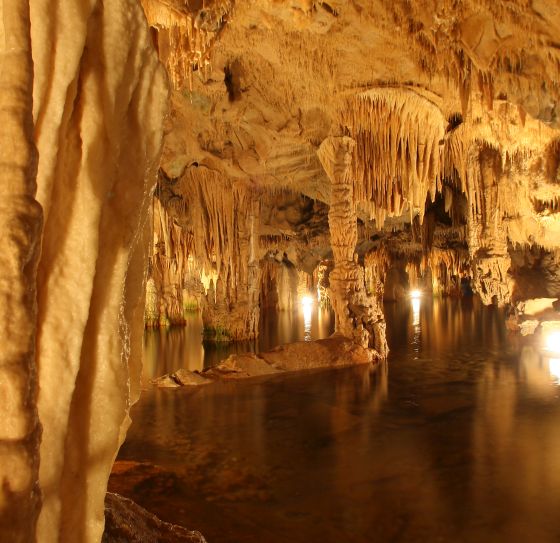
Caving
Exploring caves in Greece is a unique adventure that offers explorers the opportunity to acquire and to enrich their knowledge with the essentials of geology, paleontology, anthropology, hydrology, topography, physics, biology and archeology. Greek caves are among the most beautiful in the world. Visitors are enthralled with the splendors of the geological formations, the subterranean waters, the colors that are out of this world and the sounds of the earth.
Many Greek caves have been explored and quite a few of these have been exploited and are now open to the public. There are still many caves that have not been fully explored, nor exploited. Tours of these caves are carried out but only under certain conditions, and of course with the necessary license.
In addition, the aspiring explorer of a non-exploited cave must realize that sightseeing in a cave is not an endeavor for just anyone, as special knowledge and nimbleness are required, as well as being in good physical condition. Special tools, clothing, gloves and light sources are needed, while at least three people must be in the group that enters the cave. Aspiring explorers must also be aware that caves constitute unique treasures of the land, as well as man’s civilization in quite a few instances. Therefore all visitors must respect the environment and not leave behind any litter or other traces of their presence.
Greek legislation does not permit private individuals to explore caves, unless they are members of a speleological society and have received permission from the Ephorate of Paleontology and Speleology of the Ministry of Culture.



